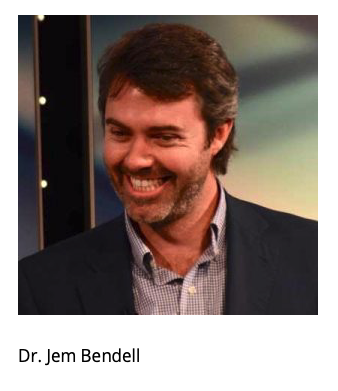
Jem Bendell – 14 Recommendations on Living Beyond Collapse Denial
Professor Jem Bendell coined the phrase, Deep Adaptation, in 2018. His writings on facing our inevitable, climate change driven, social collapse, are being received hungrily around the world.
This is an excerpt from a recent blog post.
(To read the entire post on Professor Bendell’s website.)
Fourteen Recommendations on Living Beyond Collapse-Denial
The following recommendations arise from reflecting on the positive and negative aspects of my past four years since I began to accept the inevitability of near term social collapse.
Return to, or explore afresh, the idea of a divine or a spirit or a consciousness or a God that is prior to the Earth and moves through the Universe right now and forever more. Do so without seeking a simple story of explanation but a sense of faith that there is an existence and a meaning beyond our culture, our species and our planet. Such ‘faith’ helps anyone to experience and process the inevitable difficulties and traumas of life.
Listen to those stories from people both past and present who tell us that despair is not the end and therefore does not have to be avoided. Recognise how many spiritual traditions see despair as a gateway to our growth.
Beware when people are promoting their views on what they think the implications of information will be, rather than views on the information itself. The impacts of certain information about climate on other people’s motivations are not certain, and in many cases the darkest analyses have triggered a new level of creativity and boldness. Instead, look at the information and analysis directly for yourself, without second guessing what some interpretations might lead to.
Recognize that any emotional or intellectual resistance you may experience to information which implies catastrophe may come from what you have been consciously or subconsciously telling yourself about your own self-worth, purpose and meaning. Then remember how your views of yourself and the world have evolved through your life and still can.
Don’t panic. Give yourself time to evolve both personally and professionally in response to your emerging awareness, but ensure you stay connected to a group or an activity which keeps reminding you of the basis for your emerging awareness.
Recognize there is much work ahead for you to reconstitute concepts of meaning and what’s good and to align your life with those. It will not happen overnight, yet it will not happen if you do not give time to this work. There may be some time needed to bridge your existing life with the way you will want to live in future.
Plan more time and resources for you to do things which inspire wonder at life. This could be more time in beautiful environments, or with uplifting music, or in contemplation, or through creative writing, or being with loved ones and close friends. That means freeing up time from other activities such as TV, social media and mainstream news. It may also mean downshifting from your workload.
Look for opportunities for supported self-reflection and sense-making. This is because your worldview and self-identity will undoubtedly transform overtime as you process the new information and analysis.
Expect a catharsis, both personal and professional. This will occur because the subconscious or conscious limits that you placed on yourself until now will be lifted. Go with that rush of energy and creativity, but be vigilant that those new activities don’t become so consuming they distract you from the personal work you still need to do.
If you are a mission-driven professional in fields related to environment or social justice then expect that you may be driven to rebuild a sense of self-worth and that this need of the ego, while natural and potentially useful, could become a frantic distraction.
Expect a change in your personal relationships and how you spend your spare time. Some forms of small talk and light-hearted social interaction with acquaintances may seem pointless, while you may wish to spend more time with close friends and family. While for some this could be a welcome rebalancing, for others this can become a vector of reclusiveness and loneliness. Therefore, it is important to find new ways of connecting with people on the new levels that feel meaningful to you.
Create a positive vision of people sharing compassion, love and play. It may feel that an eco-tragic outlook means you cannot have any meaningful vision of a better future for yourself, your community, or humanity. An absence of something positive to work towards can be destabilising and limiting. Some people will think you are depressed – or depressing – and need some “positive thinking”. For a personal vision, the answer may lie in developing a vision for how you will be approaching life, rather than imagining attributes of a lifestyle. This may parallel the dimensions of a collective vision. A future full of love and learning, rather than flying cars and fancy robots, could be a way to imagine a more beautiful world. And remember, the future will still be beautiful in its own way, no matter what life forms are in it – or if your favourite town is under water!
Don’t get dogmatic and avoid those who do. That comes from recognising that our terms for phenomena are not the same as the phenomena themselves. The words we use imply things which may have effects on us but aren’t necessarily so. Words like near-term, civilisation, collapse, and tragedy, are our words, and may trigger ideas, images and emotions which aren’t inevitable consequences of the phenomena being described.
Do not prioritise maintaining your own mental and physical situation at the expense of the need to act in solidarity with future generations who will live with the future we are creating for them. Tomorrow’s children won’t thank us much for having joined a support group on Facebook or taken up yoga, unless it aligned with us remaining active in the world.
